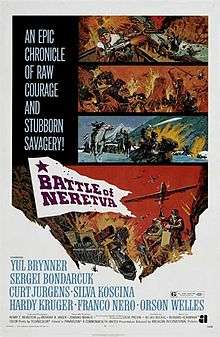Battle of Neretva (film)
| Battle of Neretva | |
|---|---|
 US film poster | |
| Directed by | Veljko Bulajić |
| Produced by | Steve Previn |
| Screenplay by |
Ratko Djurovic Stevan Bulajic Veljko Bulajić Ugo Pirro English Version: Alfred Hayes |
| Story by |
Stevan Bulajic Ratko Djurovic |
| Starring |
Yul Brynner Sergei Bondarchuk Curt Jürgens Sylva Koscina Hardy Krüger Franco Nero Orson Welles |
| Music by |
Vladimir Kraus-Rajteric English Version: Bernard Herrmann |
| Cinematography | Tomislav Pinter |
| Edited by | Vojislav Bjenjas |
Production company | |
| Distributed by | American International Pictures (US) |
Release dates |
|
Running time |
175 minutes 105 minutes (English Version) |
| Country |
Yugoslavia Italy West Germany United States[1] |
| Language |
Serbo-Croatian Italian German English |
| Budget | $12 million |
Battle of Neretva (Serbo-Croatian: Bitka na Neretvi / Битка на Неретви, Slovene: Bitka na Neretvi,[2]) is a 1969 Yugoslavian partisan film. The film was written by Stevan Bulajić and Veljko Bulajić, and directed by Veljko Bulajić. It is based on the true events of World War II. The Battle of the Neretva was due to a strategic plan for a combined Axis powers attack in 1943 against the Yugoslav Partisans. The plan was also known as the Fourth Enemy Offensive and occurred in the area of the Neretva river in Bosnia and Herzegovina.
Battle of Neretva is the most expensive motion picture made in the SFR Yugoslavia.[3] It was nominated for the Academy Award for Best Foreign Language Film,[4] the year after Sergei Bondarchuk (playing the role of Martin in Neretva) won the honour for War and Peace. The score for the English-speaking versions was composed by Bernard Herrmann. Its soundtrack was released by Entr'acte Recording Society in 1974. It was re-released on Southern Cross Records on CD.
One of the original posters for the English version of the movie was made by Pablo Picasso, which, according to Bulajić, the famous painter agreed to do without payment, only requesting a case of the best Yugoslav wines.[5]
Cast
- Sergei Bondarchuk as Martin
- Yul Brynner as Vlado
- Curt Jürgens as Gen. Lohring
- Bata Živojinović as Stole
- Sylva Koscina as Danica
- Boris Dvornik as Stipe
- Hardy Krüger as Col. Kranzer
- Franco Nero as Capt. Michele Riva
- Lojze Rozman as Ivan
- Ljubiša Samardžić as Novak
- Orson Welles as Chetnik senator
- Milena Dravić as Nada
- Špela Rozin as Aide
- Pavle Vuisić as Jordan
- Fabijan Šovagović as Mad Boško
- Anthony Dawson as Gen. Morelli
- Dušan Bulajić as Chetnik Commander
- Renato Rossini as Sgt. Mario
- Oleg Vidov as Nikola
- Kole Angelovski as Žika
- Stole Aranđelović as Šumadinac
- Demeter Bitenc as Capt. Schröder
- Ralph Persson as Lt. Horst
- Miha Baloh as Ustasha Commander
- Faruk Begolli as Stevo
- Zaim Muzaferija as tall peasant in the Partisans column
Production

Battle of Neretva was first of the huge state-sponsored World War II film productions. It had a staggering budget approved personally by Yugoslav president Josip Broz Tito. Different sources put it anywhere between $4.5 million and $12 million. Global stars such as Sergei Bondarchuk, Yul Brynner, Franco Nero, Orson Welles, etc. flocked to communist Yugoslavia attracted by the huge sums of money being offered.
Shot over 16 months with funds put up in largest part by over 58 self-managed companies in Yugoslavia, the movie featured a combined battalion of 10,000 actual Yugoslav People's Army (JNA) soldiers. Four villages and a fortress were constructed for the film, and subsequently destroyed. Several army-inventory Soviet T-34 tanks, touched up to look like German panzers, met the same fate.
Additionally, an actual railway bridge over Neretva River in Jablanica was destroyed. Director Bulajić's justification for taking down an actual bridge rather than getting the shots in studio was that a destroyed bridge would later become a tourist attraction. The bridge was thus blown up, but because none of the footage was usable due to the billowing smoke that made it impossible to see anything, it was decided that the bridge should be repaired and destroyed again. However, the problem with the excessive smoke occurred even when the bridge was blown up for the second time. Finally, the scenes of the bridge being blown up that eventually ended up in the film were shot using a small scale table-size replica at a sound stage in Prague.[5]
Throughout the movie's production, the Yugoslav public was updated on the shooting progress via pieces in the country's print media.[6][7]
Reception
In 1999, a poll of Croatian film fans found it to be one of the best Yugoslavian films ever made.[8] People still enjoy it and it is praised for being historically correct and entertaining at the same time. It still has fans all over the former SFRY.
See also
- List of Yugoslav films
- List of most expensive non-English language films
- List of submissions to the 42nd Academy Awards for Best Foreign Language Film
- List of Yugoslav submissions for the Academy Award for Best Foreign Language Film
References
- ↑ https://books.google.com.au/books?id=C5_3AgAAQBAJ&pg=PA218&dq=Battle+of+Neretva+1969&hl=en&sa=X&redir_esc=y#v=onepage&q=Battle%20of%20Neretva%201969&f=false
- ↑ [http://www.rtvslo.si/kultura/film/se-ena-svetovna-pot-za-kultni-film-bitka-na-neretvi/247878 L.Š.: Še ena svetovna pot za kultni film Bitka na Neretvi, RTV Slovenia, Jan 5 2011
- ↑ Bitka na Neretvi (Croatian)
- ↑ "The 42nd Academy Awards (1970) Nominees and Winners". oscars.org. Retrieved 2011-11-16.
- 1 2 Robna kuća: Bitka na Neretvi on YouTube
- ↑ Glumci na služenju vojske!;Plavi vjesnik, July 1968
- ↑ Najveći honorari Bati i Ljubiši!;Plavi vjesnik, July 1968
- ↑ ""Tko pjeva, zlo ne misli" najbolji hrvatski film svih vremena!". Slobodna Dalmacija (in Croatian). 1999-11-28. Retrieved 2013-02-08.
External links
- Bitka na Neretvi at the Internet Movie Database
- The Battle of Neretva at AllMovie
- Razgovor s Veljkom Bulajićem (Croatian)